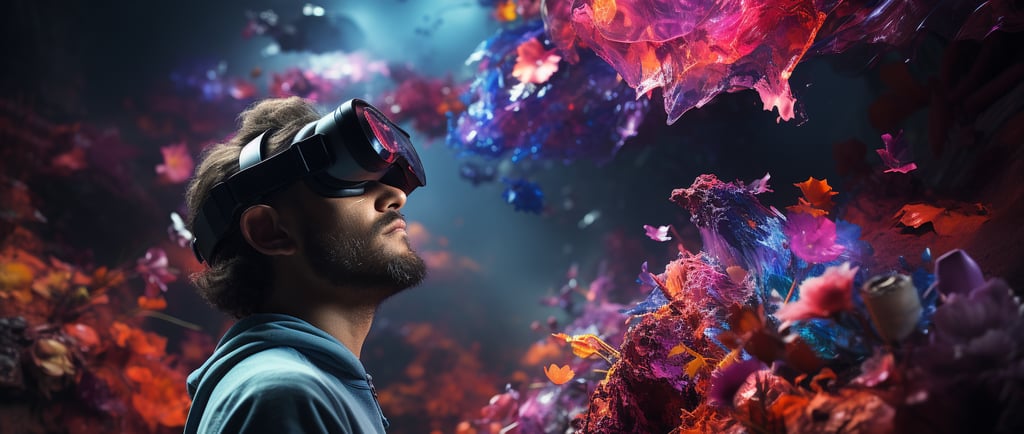The Power of Immersive Experience in Events
Creating Lasting Memories and Meaningful Connections
EVENTS
High Resolution Events
7/29/20233 min read


The Power of Immersive Experience in Events: Creating Lasting Memories and Meaningful Connections
In the world of event planning, creating a memorable and engaging experience for attendees is paramount. As technology continues to evolve, event organizers have increasingly turned to immersive experiences to elevate their events to the next level. An immersive experience goes beyond the traditional event format, transcending passive participation and inviting attendees to become active participants in the event's narrative. This article explores the concept of immersive experience and its pivotal role in events, emphasizing its ability to leave a lasting impact on participants and forge meaningful connections.
Understanding Immersive Experience:
An immersive experience is one that fully engulfs participants, blurring the lines between the real world and a carefully crafted environment. It transports attendees into a captivating realm, where they are encouraged to interact, engage, and explore, making them an integral part of the event's story. This can be achieved through a combination of technologies such as virtual reality (VR), augmented reality (AR), mixed reality (MR), interactive installations, multisensory elements, live performances, and more.
The Role of Immersive Experience in Events:
Enhanced Engagement: Immersive experiences capture attendees' attention and imagination, effectively eliminating distractions and ensuring active participation. By involving multiple senses, such as sight, sound, touch, and even smell, these experiences create a lasting impression that conventional events often fail to achieve.
Stronger Emotional Connection: Immersive events have the power to evoke strong emotions, leaving attendees with a sense of wonder and amazement. By tapping into emotions, organizers can forge a deeper connection between attendees and the event's message or brand, fostering brand loyalty and positive word-of-mouth.
Memorable Impact: Traditional events may fade from memory quickly, but immersive experiences create lasting memories. Attendees are more likely to recall and share their experiences with others, amplifying the event's reach and impact.
Fostering Creativity and Learning: Immersive experiences provide a fertile ground for creativity and learning. Attendees can explore new concepts, engage in problem-solving scenarios, and experience things from unique perspectives, all of which contribute to a richer and more fulfilling event experience.
Building Communities: Shared immersive experiences can unite attendees, fostering a sense of belonging and community. These events provide opportunities for participants to interact with like-minded individuals, creating social bonds that extend beyond the event itself.
Brand Differentiation: In today's competitive event landscape, standing out is crucial. Immersive experiences can set an event apart from the rest, giving attendees something truly unique and memorable to talk about.
Examples of Immersive Experiences in Events:
Virtual Reality Exhibits: Events that feature VR exhibits allow attendees to be transported to distant places, explore simulations, or engage in interactive games, all within the confines of the event space.
Augmented Reality Scavenger Hunts: AR scavenger hunts encourage attendees to explore the event venue while searching for virtual clues and engaging with digital elements superimposed on the real world.
Themed Installations: Elaborate, themed installations can immerse attendees in an entirely different world, such as a futuristic cityscape, a magical forest, or an ancient civilization.
Interactive Performances: Events that incorporate interactive performances, where attendees can influence the outcome or actively participate, bring a sense of spontaneity and excitement.
Multisensory Presentations: Utilizing a combination of visual, auditory, olfactory, and tactile elements, multisensory presentations can create a deeply immersive and unforgettable experience.
Considerations for Creating Immersive Experiences:
While immersive experiences can be powerful tools in event planning, some key considerations should be kept in mind:
Purpose and Message: Ensure that the immersive elements align with the event's purpose and intended message. Immersion should enhance the event, not overshadow its core objectives.
Accessibility: While creating an immersive experience, consider the needs of all attendees, including those with disabilities, to ensure inclusivity.
Technology Reliability: Immersive experiences often rely on technology, so it's crucial to have contingency plans in case of technical issues.
Seamless Integration: The immersive elements should seamlessly integrate with the event flow and overall design, creating a cohesive experience for attendees.
Balancing Interactivity: Strive to strike the right balance between attendee participation and passive observation, as some attendees may prefer different levels of engagement.
In conclusion, immersive experiences have revolutionized the events industry by providing unparalleled engagement, emotional connection, and lasting memories. They have become an essential tool for event organizers looking to create impactful and unforgettable experiences for their attendees.
By leveraging immersive technologies and creative storytelling, events can transcend the ordinary and leave a profound and lasting impression on all who participate. As the event industry continues to evolve, embracing the power of immersion will undoubtedly be a key factor in shaping the events of the future.
